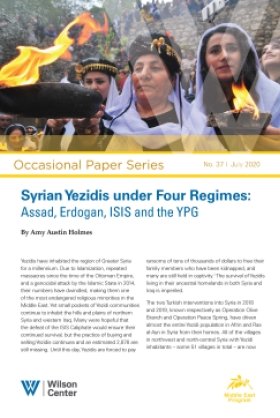Syrian Yezidis Under Four Regimes: Assad, Erdogan, ISIS and the YPG


Yezidis are one of the most endangered religious minorities in the Middle East. Islamization, centuries of discrimination and massacres, and a genocidal attack waged by Islamic State in Sinjar, Iraq in 2014 threatens their survival as a people. In Syria, Yezidis living in their ancestral homelands have experienced rule under four different regimes since 2012: the Syrian Baathist regime, the Islamic State, the Kurdish-led self-government known as the Autonomous Administration of North and East Syria (AANES), and now the Turkish occupation initiated by Operation Olive Branch and Operation Peace Spring. The author compares the treatment of Syrian Yezidis under each of these four governments and the impact on their effort to reclaim and rebuild their ancient communities. In her conclusion, the author proposes recommendations for United States policymakers as Syrian Yezidis are presently faced with forced demographic change under Turkish occupation, and need international support to rebuild and preserve their heritage.
Author

Research Professor of International Affairs and Acting Director of the Foreign Area Officers Program, George Washington University

Middle East Program
The Wilson Center’s Middle East Program serves as a crucial resource for the policymaking community and beyond, providing analyses and research that helps inform US foreign policymaking, stimulates public debate, and expands knowledge about issues in the wider Middle East and North Africa (MENA) region. Read more

Explore More
Browse Insights & Analysis
Women are the Catalysts for Change in Lebanon


